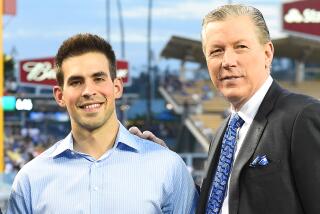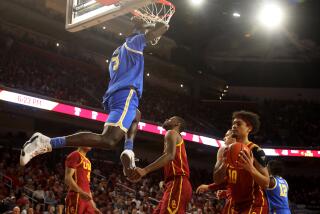COMMENTARY : K.C. Jones Quietly Returns to Boston
- Share via
BOSTON — Sal Tecce was conducting a tour of the family restaurant the other night when he led a visitor into a dining area they call the Street Cafe Room.
“Now this,” he said, speaking out the side of his face, “this I don’t think K.C. will be real excited about. We took the piano out this summer. K.C., he’s never been here when there wasn’t a piano.”
The narrow, rectangular room is decked out to resemble a street in Rome. It has small tables on raised platforms on either side of the room. The platforms are covered in red brick for the look of a sidewalk. Tecce pointed to a spot near the center of the room.
“That’s where the piano was,” he said. “K.C. used to love to sit over there after games, have something to eat and sing those songs. He’d sing some standards and he’d sing that ‘doo-doo-dee-doo’ kind of thing like Al Jarreau. Cat singing? Scat singing? Whatever, K.C.’s a pretty good singer, pretty damn good.
“Maybe I can get him to sing again even if we don’t have the piano no more.”
Tecce’s Ristorante was opened by Sal’s father, Joe, in 1948 on the north side of the city, a short distance from the Italian section of town. It’s just down the street and around the corner from Boston Garden, home of the Celtics since they came into the league in the 1946-47 season.
You sit down here with a bowl of pasta and you feel you are in someone’s home.
“When he comes by,” waitress Annette Fitzgerald said of K.C. Jones, “I know exactly what he’ll want. He doesn’t like garlic much so we make him a special dish of shrimp sauteed in lemon and butter with sauteed broccoli on the side. I know K.C. Jones, that’s what he’ll want to eat.”
Business is good at Tecce’s. Papa started with 10 to 15 tables and he can now seat nearly 200. Walls have been knocked out and additional dining rooms added as demanded by the ever-increasing clientele. They sell their own sauces and memorabilia. A wall near the front door is stacked with merchandise. A small sign near the middle says, “Everything on this wall is for sale.”
The piano, the centerpiece of the ambience in the Sidewalk Cafe Room, was removed in favor of television sets so the diners can watch sports.
As with a lot of other black players who came to Boston, the first day he was in town, K.C. Jones went to the home of Hy and Sylvia Horowitz, longtime season-ticket holders who helped black players find suitable housing.
Hy Horowitz and a friend would go to sections of Boston where they thought a black person might be accepted into a neighborhood. They would inquire about rent, then they’d talk to some people who lived there to determine if there were any objections.
“Dad loved the Celtics, but he knew about the bigotry around here,” said son David Horowitz, a close friend of Jones. “He didn’t want the players getting turned off or getting in trouble by stumbling into the wrong area, so he’d scout out places for them.”
David Horowitz vividly remembers Jones’ first day in Boston.
“Like it happened yesterday,” he said. “What’s there to remember? He came into the living room, sat down by the piano, said ‘Hello,’ then later on when we were all through he said ‘Goodbye’ on the way out. Very quiet.
“I’ve ridden with him from Boston to New Hampshire in a car where neither of us said a word the entire trip. He’s a thinker, not a talker.”
Mostly, when they talk about K.C. Jones in Boston, his friends mention integrity, or dignity. Class. His remaining critics will give him that, but they will say he doesn’t have the heat in his guts it takes to be a coach.
Too relaxed, too laid back.
It’s a popular misconception about K.C. Jones. Arnold “Red” Auerbach personified K.C. Jones as a player, and the quote has evolved into a description of a whole subsection of player types.
“If we were behind and I put him in,” Auerbach said, “when I took him out, we were ahead. If we were ahead and I put him in, when I took him out we were ahead by more than when I put him in.”
Jones the player was like Jones the coach. No flamboyance, he got it done by enhancing the play of everyone around him.
He didn’t take losses any better than the coaches who smash lockers and throw tantrums, he just took them differently.
“My daughter was here over Thanksgiving,” David Horowitz said, “and after dinner we got into a conversation for some reason about the Celtics. She wanted to know what this thing was about ‘Celtic Pride’ and tradition, and I thought immediately of K.C. It’s a pride in yourself, a pride to do what you know needs to be done to make the team as good as it can be. Forget about points and rebounds and contracts and all that stuff. Win the game. That’s what it’s about.
“K.C. took losses hard, because he expected to win every time. When he lost a game, he thought something was wrong, he didn’t feel good. We would have dinner planned after a game, and if they lost, there was no discussion, you just went straight home. Nobody went out to dinner after losing, are you kidding?
“K.C. was coaching the Bullets when they beat the Celtics in the playoffs, in the Garden. We were the last two out of the locker room. We walked out to go to Tecce’s and there was Charlie Scott and Jo Jo White, leaning on Charlie’s Mercedes, laughing and joking. K.C. saw that and couldn’t believe it. They were just beaten at home in the playoffs by a former Celtic and they were happy.”
Horowitz, a broker who deals in lumber and building materials, doesn’t go to games much anymore. Through connections with his father, who attended all but 11 home games from the time the Garden opened until he died in 1971, David Horowitz spent “a good deal of my youth in that building.”
He’s turned off by the modern athlete, the money, the agents, the personality clashes on teams and the players who won’t play with minor injuries.
Monday night, David Horowitz will go to his first Celtics game of the season.
K.C. Jones is back in town.
He’ll coach against the Celtics again when he brings the Seattle SuperSonics, emotionally battered by a triple overtime loss at home Saturday to Portland, into the Garden.
This is a tough place to gain coaching recognition, because it’s the place Auerbach won nine NBA championships, eight of them in a row. Say what you will about Yankee Pride or Raiders Mystique, there are few sporting organizations at any level that can begin to compare with Celtics tradition in terms of long-term dominance in a given sport.
K.C. Jones coached here five seasons after taking the Washington Bullets to the playoffs three years in a row. In two of those five Celtics years, he brought back championships.
You could walk through the Garden tonight at the Sonics game and ask longtime fans about K.C. Jones and they’d tell you while he did a helluva job winning two titles, he should have won four.
What’s interesting is that of all the ones who have coached the Celtics over the years, K.C. Jones has the best winning percentage regular season (308-102, .751), and playoffs (65-37, .637), of them all. Better than Bill Fitch, Tom Heinsohn, Bill Russell and Auerbach.
Tonight won’t be the first time he’s coached against the Celtics -- his Bullets dethroned defending league champion Boston in the 1975 playoffs. Tonight will be the first time he’s coached the Sonics against the Celtics.
This Sonics team is different. It has no center. If its leading scorer isn’t in relationship problems, he’s in problems related to moving automobile violations or excessive drinking or both, problems in bars on the road, or problems gaining respect from his teammates.
It is a team with one classic, multi-talented underachieving forward and another classic overachieving forward beset by knee operations. It has a spectacular outside shooter from Boston College no taller than most high school guards, and is a team with an absolute unpolished gem of a point guard nobody wants to see turned in the wrong direction by this collection of One Flew Over The Cuckoos Nest All-Stars.
Injuries and off-court problems last year kept the Sonics teetering on the precipice that separated consistency and chaos. For spurts, they played well and with promise, then they’d lose a player for a few weeks to an injury or someone would fall in a slump or Dale Ellis would be arrested again.
K.C. Jones came into situations in Washington and Boston where most of the talent was in place, and required only focusing. With the Sonics, most of the talent is not in place and the focusing will come after they get the picture on the right channel.
His system is very simple and is reliant on players working together to develop trust and belief in each other. While he’s trying to do that, Xavier McDaniel and Dale Ellis engaged in a serious fist fight on the street in front of the team’s office just a week ago.
Players came into the season hearing and reading stories everywhere about being traded. Instead of settling down and letting the system develop, the Sonics have been mostly unable to break their old habits, like junk food addicts living on a farm with vegetarians.
This is a team that belongs in the NBA all right, the Neurotic Basketball Association.
Getting the Bullets to the playoffs was a coaching challenge. Continuing the Celtics reign of success was a challenge.
This though, is the career coaching challenge for K.C. Jones, a spot of calm in an ocean of chaos.
This one needs to be revisited. In the 1974-75 playoffs, the K.C. Jones-coached Washington Bullets beat defending league champions Boston, then lost four in a row to the Golden State Warriors in the championship series. In the closing minutes of the second game, the Bullets were down by two points when Jones called a timeout.
Jones learned from Auerbach that coaches do their coaching in practice. On game nights, it’s the players’ turn to earn their paychecks. Auerbach would lean into a huddle during a timeout and say, “Run the A play.” That was it. You never saw Red Auerbach with a chalkboard diagramming a play.
Jones was the same way. In that game against the Warriors, Jones and his then-assistant Bernie Bickerstaff discussed the play. Jones called a C play, a simple play run off a pick and roll, a play they had run hundreds of times during the season.
Bickerstaff asked if he should diagram the play, and Jones, thinking it might help the players focus, said, “Sure, go ahead.”
The next thing viewers saw on national television was Bickerstaff furiously diagramming a play in a critical timeout with K.C. Jones standing by silently and impassively. Television announcers questioned why an assistant would be diagramming a play and why it was necessary to diagram one at all in this circumstance.
Jones took an avalanche of criticism after that game. Papers said he was unprepared, that he needed Bickerstaff to do his coaching for him and that he was unprofessional.
A year later he got them back to the playoffs, but when the Bullets didn’t win a title. he was fired.
Then came five years with the Celtics, a decision by Jones to resign from coaching and take a Boston front office job he later found boring. He came back last year to assist Bickerstaff, his former assistant, in Seattle, and now he has his own team again, Team Chaos.
The Sonics season isn’t 15 games old yet and people, some of them on the team, are wondering how this can work with K.C. Jones, the professor of unity, in charge of a disorganized, disbelieving cast of characters.
Keeping in mind his placid exterior, they ought to look up his record. If nice guys only finish last, K.C. Jones is the exception to the rule, because wherever he’s been, all he ever did was win.


